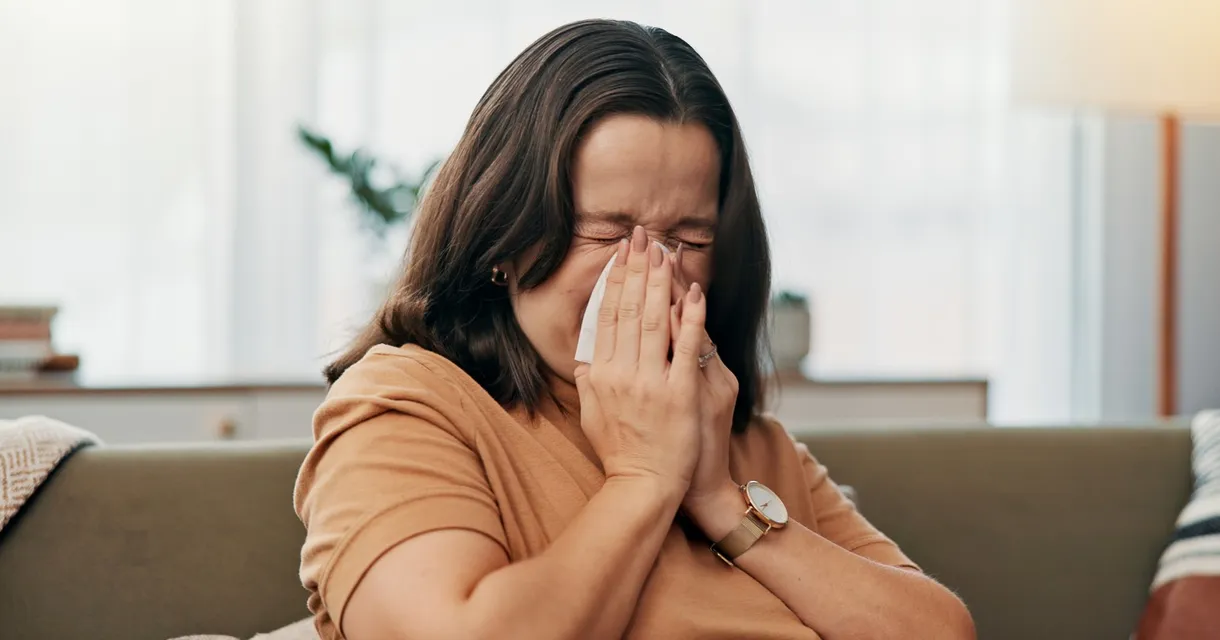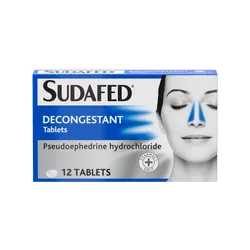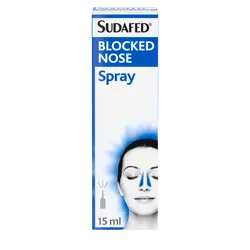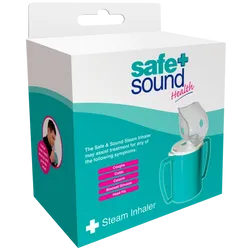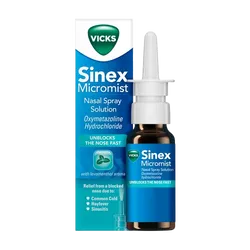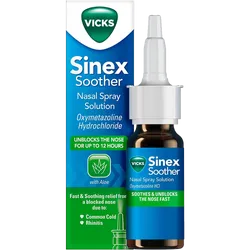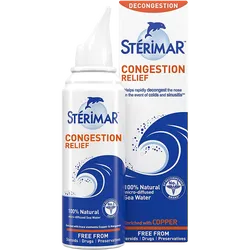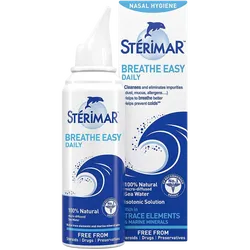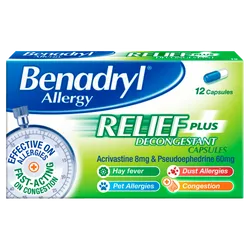A runny or blocked nose is typically caused by inflammation of the nasal passages due to infections like the common cold or flu, or irritants such as allergens. You can find relief through a combination of natural remedies and over-the-counter medications, including decongestants and saline sprays, which help reduce swelling and clear mucus.
A blocked or runny nose can be incredibly frustrating and uncomfortable, making it difficult to breathe, speak, and sleep. This constant irritation can often lead to headaches and facial pain, adding to the misery of a cold or flu. Fortunately, there are many effective ways to find relief and get back to feeling your best.
Blocked or Runny Nose: Causes, Symptoms & Relief
What Causes a Blocked Nose?
A blocked nose, also known as nasal congestion, happens when the tissues lining your nose become swollen due to inflamed blood vessels. This swelling makes it hard for air to pass through.
Common causes include:
- The Common Cold or Flu: The most frequent culprits. Your body increases mucus production and inflames the nasal passages to fight off the virus.
- Sinusitis: An inflammation of the sinuses, often caused by a bacterial or viral infection.
- Allergies: Your body’s reaction to triggers like pollen, dust mites, or pet dander.
- Non-allergic Rhinitis: A chronic condition with symptoms similar to allergies but without an identifiable allergen.
- Irritants: Exposure to smoke, strong perfumes, or dry air.
How to Unblock Your Nose
Natural Remedies:
Steam Inhalation: Inhaling steam through a Steam Inhaler or taking a hot shower will warm and moisten the mucus, helping to loosen it and make it easier to clear.
Saline Nasal Sprays: These nasal sprays help to moisturise the nasal passages using a salt and water solution to loosen thick mucus, which helps to flush out irritants like allergens and crusts.
Staying Hydrated: Drinking plenty of water helps to thin mucus. When you're dehydrated the mucus becomes thick and difficult to remove.
Humidifiers: Using a humidifier, especially at night, can help add moisture to the air and soothe nasal passages.
Medication Options:
Oral Decongestants: These medicines, such as those containing pseudoephedrine or phenylephrine, reduce the swelling of blood vessels in your nose.
Decongestant Nasal Sprays: Sprays containing ingredients like xylometazoline or oxymetazoline provide fast-acting relief by constricting blood vessels in the nose.
Antihistamines: If your blocked nose is due to an allergy, an antihistamine can help manage the reaction. Some antihistamines also include decongestant ingredients such as Benadryl Relief Plus.
Weldricks Recommended Products for Blocked Noses:
Vicks Sinex Soother Nasal Spray: This spray contains oxymetazoline hydrochloride, which works quickly to relieve congestion for up to 12 hours. It's a great option for fast, long-lasting relief.
Sudafed Decongestant Tablets: A popular choice containing pseudoephedrine, these tablets help to clear a blocked nose from within.
Sterimar Nasal Hygiene Spray: A simple, drug-free sea water spray that cleanses and moisturises the nasal passages, perfect for everyday use or for those who prefer a natural approach.
How to Unblock Your Nose at Night
A blocked nose can feel even worse at night due to the effects of gravity and a condition called postnasal drip, where mucus drains down the back of your throat. This can lead to a cough and disrupted sleep. To get a better night's rest, you might consider the following:
- Elevate Your Head: Using an extra pillow can help mucus drain and prevent it from pooling at the back of your throat.
- Warm Drinks: A cup of warm, decaffeinated tea with honey before bed can be soothing.
- Consider a Drowsy Decongestant: Some cold and flu remedies contain antihistamines which have a sedative effect, helping you to feel less restless and easing congestion for a good night's sleep.
What Causes a Runny Nose?
A runny nose occurs when the glands in your nose and throat produce excess mucus, which then becomes watery and flows out.
Common causes are similar to a blocked nose include:
- The Common Cold or Flu: The body's immune response triggers excess mucus production to trap and flush out the virus.
- Allergies: Your immune system releases histamine in response to allergens, leading to increased mucus production. Common allergens include pollen, dust, and pets. You can experience hayfever symptoms in autumn and winter too.
- Irritants: Strong smells or chemicals can trigger a runny nose.
- Cold Weather: A physiological response to cold, dry air.
- Non-allergic Rhinitis: Similar to its counterpart for a blocked nose, this is a chronic condition with no allergic trigger.
How to Stop a Runny Nose
Natural Remedies:
Steam & Hydration: Similar to a blocked nose, steam and drinking plenty of fluids can help.
Spicy Foods: Eating spicy foods can help thin mucus and temporarily relieve a runny nose.
Hot Tea: A warm cup of herbal tea can be comforting and help with drainage.
Weldricks Recommended Products for Runny Noses:
Benadryl Allergy Relief: Contains acrivastine, a non-drowsy antihistamine that is effective for relieving hay fever symptoms like a runny nose.
Lemsip Max Cold & Flu Sachets: These combine paracetamol for pain and fever with phenylephrine hydrochloride to help with nasal congestion taken in a comforting hot drink.
Nasal Wash: Using a product like a Neti pot or a similar saline wash can help flush out irritants and excess mucus.
Blocked and Runny Nose Relief from Weldricks Pharmacy
We understand how miserable a cold or flu can be. At Weldricks Pharmacy, we provide a wide range of affordable, over-the-counter remedies to help you manage the symptoms. Our pharmacists have carefully selected products to tackle not just blocked and runny noses, but also the headaches, coughs, and other related symptoms that come with them. Our trusted range of products, combined with our friendly and professional advice, ensures you can find the right treatment to get back to feeling your best. As a family-run pharmacy for nearly 100 years, we pride ourselves on being a reliable source for your everyday health needs.
Runny or Blocked Nose FAQs
When should you speak to a GP about a runny or blocked nose?
You should speak to a GP if your symptoms last for more than three weeks, or if you experience severe pain, a high fever, a rash, or a stiff neck. It’s also advisable to seek medical advice if your symptoms are getting worse or if you have a pre-existing medical condition that could be affected.
How do you unblock your nose fast?
For fast relief, a decongestant nasal spray is often the most effective option. These sprays work directly on the nasal passages to quickly reduce swelling and open up your airways.
How to sleep with a blocked nose?
Try sleeping with your head and upper body slightly elevated on extra pillows. This can help prevent mucus from pooling in your sinuses. Using a humidifier in your bedroom to add moisture to the air and taking a warm shower before bed can also help to soothe and clear your nasal passages.
Is it better to let a runny nose run?
Allowing your nose to run naturally is a way for your body to expel viruses and irritants. However, you can manage the discomfort with simple methods or medication. You should always blow your nose gently to avoid irritating the nasal passages.
What not to do during a runny nose?
Avoid using too many different types of nasal sprays at once, as this can lead to rebound congestion. Do not use over-the-counter nasal decongestant sprays for more than a few days, as your body can become reliant on them. Also, avoid irritating substances like smoke or strong fumes.
What should you drink if you have a runny nose?
Staying hydrated is key. Drink plenty of water, clear broth, and herbal teas. Warm liquids, in particular, can help soothe your throat and thin out the mucus.
What helps a runny nose in the elderly?
For older adults, staying hydrated is crucial. Saline nasal sprays are a gentle and effective option. They should be cautious with certain decongestants which may interact with existing medications or health conditions, so it's always best to consult a pharmacist before starting any new medication.
